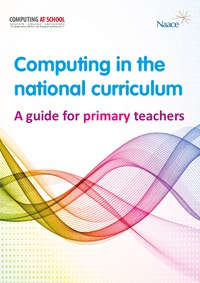Computing in the national curriculumA guide for primary teachers
Naace, Miles Berry
Publikationsdatum:
|
 |
 Diese Seite wurde seit mehr als 7 Monaten inhaltlich nicht mehr aktualisiert.
Unter Umständen ist sie nicht mehr aktuell.
Diese Seite wurde seit mehr als 7 Monaten inhaltlich nicht mehr aktualisiert.
Unter Umständen ist sie nicht mehr aktuell.
 Zusammenfassungen
Zusammenfassungen
 Computers are now part of everyday life. For most
of us, technology is essential to our lives, at home
and at work. ‘Computational thinking’ is a skill
children must be taught if they are to be ready for
the workplace and able to participate effectively in
this digital world.
Computers are now part of everyday life. For most
of us, technology is essential to our lives, at home
and at work. ‘Computational thinking’ is a skill
children must be taught if they are to be ready for
the workplace and able to participate effectively in
this digital world.The new national curriculum for computing has been developed to equip young people in England with the foundational skills, knowledge and understanding of computing they will need for the rest of their lives. Through the new programme of study for computing, they will learn how computers and computer systems work, they will design and build programs, develop their ideas using technology and create a range of content. But what does this mean for primary schools? How should school leaders be planning for the new curriculum and how can teachers develop the additional skills they will need?
The programme of study is expressed in precise but perhaps unfamiliar language. This guide has been written especially for primary teachers, to demystify the programme of study for primary schools. It will enable teachers to get to grips with the new requirements quickly and to build on current practice. It includes help for schools with planning and gives guidance on how best to develop teachers’ skills.
 Dieser Text erwähnt ...
Dieser Text erwähnt ...
 Dieser Text erwähnt vermutlich nicht ...
Dieser Text erwähnt vermutlich nicht ... 
 Nicht erwähnte Begriffe | Bildung, Digitalisierung, Informatik-Didaktik, Kinder, Lehrplan 21, Lernen, Schweiz |
 Tagcloud
Tagcloud
 Einträge in Beats Blog
Einträge in Beats Blog
 Zitationsgraph
Zitationsgraph
 Zitationsgraph (Beta-Test mit vis.js)
Zitationsgraph (Beta-Test mit vis.js)
 1 Erwähnungen
1 Erwähnungen 
- Medienpädagogik und Didaktik der Informatik - Eine Momentaufnahme disziplinärer Bezüge und schulpraktischer Entwicklungen (2018)
- A Design-Based Research Approach for introducing Algorithmics and Programming to Bavarian Primary Schools - Theoretical Foundation and Didactic Implementation (Katharina Geldreich, Alexandra Simon, Peter Hubwieser)


- A Design-Based Research Approach for introducing Algorithmics and Programming to Bavarian Primary Schools - Theoretical Foundation and Didactic Implementation (Katharina Geldreich, Alexandra Simon, Peter Hubwieser)
 Volltext dieses Dokuments
Volltext dieses Dokuments
 |  Computing in the national curriculum: Artikel als Volltext ( Computing in the national curriculum: Artikel als Volltext ( : :  , 5174 kByte; , 5174 kByte;  : :  2021-03-21) 2021-03-21) |
 Anderswo suchen
Anderswo suchen 
 Beat und dieser Text
Beat und dieser Text
Beat hat Dieser Text während seiner Zeit am Institut für Medien und Schule (IMS) ins Biblionetz aufgenommen. Beat besitzt kein physisches, aber ein digitales Exemplar. Eine digitale Version ist auf dem Internet verfügbar (s.o.). Es gibt bisher nur wenige Objekte im Biblionetz, die dieses Werk zitieren. Beat hat Dieser Text auch schon in Blogpostings erwähnt.
 Biblionetz-History
Biblionetz-History 
default1
default2
default3
default2
default3









 Computer
Computer LehrerIn
LehrerIn Office 365
Office 365 Primarschule (1-6) / Grundschule (1-4)
Primarschule (1-6) / Grundschule (1-4) Programmieren
Programmieren Schule
Schule Software
Software turtle graphics
turtle graphics Unterricht
Unterricht



 QR-Code dieser Seite
QR-Code dieser Seite